
Full details for the direct-to-video Specials!
The Jukebox Puppet Band:
A Day in the Life
Quality Family Entertainment 1993
Written by Sean Kelly
Directed by Steven Feldman and Craig Marin
Summary by J. Gratton
Starring the Flexitoons by Craig & Olga Marin:
-
Didi (Olga Marin)
-
Tex (Alan Semok)
-
Rex (Craig Marin)
-
Grace (Peter Baird & Ken Miele)
-
Tito Swing (Jonathan Freeman)
-
J.J. Silvers (Craig Marin)
-
Narrator (George Page)
Episode Synopsis: Narrator George Page guides us documentary-style through a typical day in the life of the little people who live in jukeboxes. This direct-to-video special features the Jukebox Puppet Band, their manager J.J. Silvers and interspersed with song performances.

The special opens with the narrator commenting that of all the astonishing creatures with whom we share our world, perhaps none is more beloved, or misunderstood, than the species scientists call "the little people who live inside jukeboxes." It's barely dawn and the viewer is taken beneath the jukebox shell, far below the dressing room down to the "Vault" where we're introduced to a slumbering Tito Swing. Tito is described as the band leader, known to be a master of all keyboard instruments, a composer, a conductor and collector of nickels. The camera zooms into the sleeping Tito where the scene shifts to what he is dreaming about: a musical performance of the band playing "Jesse James."


The narrator reveals that the band members wake up at 6 a.m. A pig character emerges from the vault wall to send a ringing alarm clock flying over to land on Tito's head, waking him up. Tito is about to go back to sleep when he's surprised by a loud-voiced man dressed in vaudevillian clothes. The narrator introduces us to J.J. Silvers, the band's manager. The narrator adds that none of the band members appear to like him, and that his usefulness remains a mystery to this day.
The next scene is of J.J. Silvers taking the elevator up from the Vault to the band's sleeping quarters, where he shouts to wake and hurry them up. The listless band members are still groggy as the extend morning greetings to their manager.
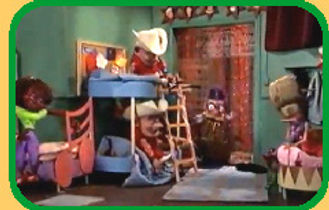
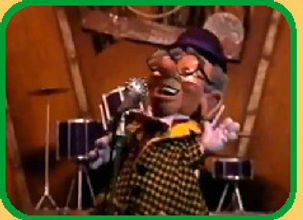
J.J. leaves them, taking the elevator up to the main level, the jukebox stage. It is now 7 a.m., and the narrator describes J.J. as becoming excited after seeing his "natural prey," a human being inserting a nickel into the jukebox. J.J. is ecstatic as the nickel slides down the chute, but there’s no one around to play a song. J.J. notices that the customer chose song 17: "Michael Row the Boat Ashore," and frets what to do next. Not hearing a song, the customer asks aloud if the jukebox is broken and begins to shake it, knocking J.J. down in the process. J.J. makes a very off-key attempt to sing the song himself when he hears the band arriving to take over. Outside the jukebox the customer listens appreciatively as the band performs.
At 7:30 a.m., the station is filling up with passengers on the move who are unaware of the little people living inside the jukebox. The narrator takes us to the jukebox stage, where he mentions that in order to survive, these tiny creatures must remain keen of eye, quick of hand, and physically fit. The band members are performing their morning exercises as they're coached along by J.J. Silvers. Didi complains that she's tired of these exercises, but J.J. reminds her that they need to stay in shape. Rex retorts that he and his brother keep in shape enough by carrying the band. Grace suggests that they play some music to motivate them, and Tito settles on playing "Take Me Out to the Ball Game.”
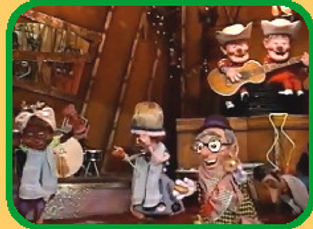
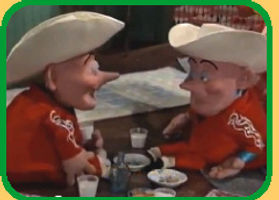
It's now 10:34 a.m., where the narrator describes a bizarre ritual scientists call a milk and cookie break. The narrator describes that despite living in a train station, they've abandoned the urge to travel, but their memories of their years on the road remain strong. Grace asks Didi if she remembers anything of being on the road. Didi recalls travelling from town to town, going places, and nostalgically adds that "those were the days." Grace agrees and asks what her favorite trip was. Didi emphatically replies that it was from NYC (New York City) to Chattanooga. Grace concurs that the trip was cool and we relive the voyage through the band's performance of “Chattanooga Choo-Choo.”
Next, a boy is seen inserting two nickels into the jukebox. Tito is excited that they're being asked to play two songs. The band plays "Freight Train Blues.” At the song's end, the band immediately performs "The Cannonball Blues."
The time is 12:02 p.m., when the band members break to eat lunch. While Tito prefers to spend his lunch hour counting nickels in the vault, the narrator mentions that the rest of the band members refresh themselves with "normal wholesome food" such as barbecue jelly beans, gumdrop pie, and butterfly milk. Didi asks where Tito has run off to, and J.J. informs her that he's in the vault counting nickels and offers to go get him. The band is alerted when a passenger inserts a nickel into the jukebox. Didi wonders if they can perform the song without Tito, but the woman passenger selected "Celito Lindo,"Tito's song. Didi suggests that they begin the song knowing that Tito never misses a music cue. Tito begins singing as he leaves the vault and makes his way up to the stage floor, emerging from the elevator in Spanish costume.
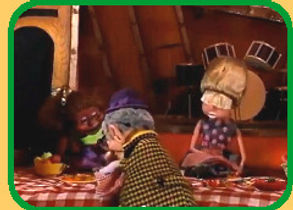
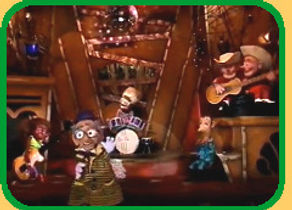
It is 1:47 p.m. as the narrator explains that making music comes naturally to the little people who live in jukeboxes; it seems to be as instinctive as the courting dance of a stork, or the song of a skylark. An impatient Tito slams the piano keys as he calls his band mates nitwits for not playing in an E key. Didi disagrees saying that they should be playing in a 5-4 tempo. The Boy Brothers ask sarcastically if the city-slickers learned to play music from the back of a cereal box which forces J.J. to intervene to stop the bickering. The band decides to cooperate and to try again, and the audience is treated to their performance of "Polly Wolly Doodle.”
J.J. compliments their performance but wonders if the song will work as a sing-along. Didi says that of course it will work, and Tito offers to play it again with J.J.'s encouragement. The band makes a repeat performance of the song, this time using a different beat.
It is 3:05 p.m. and mid-afternoon where we find that everything is quiet in the station as the band members take a siesta. J.J. wakes everyone up when a "surprise nickel" comes down the chute. The selection is number 27, "Sweet Betsy from Pike."

Later, another passenger comes up to the jukebox and inserts a nickel. Tito exclaims that it's not a real nickel, which sets J.J. off on a rant about slugs and he begins mumbling threats, until Didi points out that it's a coin that they don't have in their collection. It looks different because it's from another country, Jamaica. This inspires Tito to lead the band to perform "Jamaican Farewell."

At 6:07 p.m. the station comes to life once more as herds of migrating human beings thunder home to dinner. The band members are busy at this time counting the nickels collected that day. Didi interrupts J.J. as he's counting the day's take, making him losing count and needing to start over. Tito points out that they have a Jamaican and a Mexican coin while J.J. finds a Canadian coin. J.J. then pulls out an unusual coin which Tito identifies as a genuine buffalo nickel. The band members are impressed and sing a patriotic medley including Yankee Doodle, Dixie, I’m a Yankee Doodle Dandy and America the Beautiful.
As the narrator explains, night has fallen, bringing an end to another day in the lives of those exotic creatures, the little people who live in jukeboxes. Because they are not nocturnal, they all fall asleep at the first sign of darkness. J.J. Silvers orders everyone to go to sleep, but Grace asks Didi in a whisper if she's sleepy. Did shouts that she isn't, which rouses Rex and Tex. Grace suggests that they tell scary stories, but is interrupted by J.J. pleading with them, but the band members decide to play a scary song. Didi shouts asking for Tito's opinion, but a vampire appears and answers "VY NOT?" The frightened band members bring the jukebox to life as Tito begins to play "Midnight Special" with vocals provided by a ghost who the band initially believes is Didi.
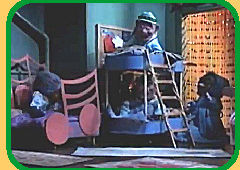
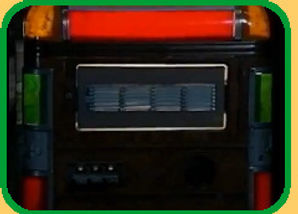
After the song, the narrator bids farewell to the little people who live in the jukebox, and bids them and the viewer a quiet good night. The special ends when the jukebox powers off, leaving the station in complete darkness.
Featured Jukebox Puppet Band Songs:
-
Jesse James, audio from “Word’s Out” (Season 1)
-
Michael Row the Boat Ashore, from “Dan's Big Race” (Season 3)
-
Take Me Out to the Ball Game, from “Field Day,” (Season 2)
-
Chattanooga Choo-Choo, from “Is Anybody There? (Season 2)
-
Freight Train Blues, from “Billy's Runaway Train” (Season 3)
-
The Cannonball Blues, from “Stacy Says No” (Season 3)
-
Celito Lindo, from “Becky Makes a Wish” (Season 3)
-
Polly Wolly Doodle, from “Schemer Alone” (Season 3)
-
Polly Wolly Doodle, (original karaoke version)
-
Sweet Betsy from Pike, from “Wrong Track” (Season 2)
-
Jamaican Farewell, from “Bully for Mr. Conductor” (Season 3)
-
Patriotic Medley: Yankee Doodle, Dixie, I’m a Yankee Doodle Dandy, America the Beautiful, from “Mr. Conductor's Fourth of July” (Season 3)
-
Midnight Special, from “Scare Dares” (Season 2)
Episode Notes:
-
The video opens with the full Shining Time Station theme, but only the main title is used before shifting to scenes from inside the jukebox.
-
Narrator George Page is noted for his work on National Geographic wildlife documentary specials from the 1970s and 1980s. He uses the same narrative style in this special.
-
The band's performance of "Jesse James" in this video is different than the one originally seen in “Word's Out,” even though the soundtrack from that episode is used. In this version, instead of performing on stage, the band plays the song on a makeshift locomotive travelling the rails.
The Jukebox Puppet Band:
Lullaby
Quality Family Entertainment 1993 / Kid Vision 1994
Written by Sean Kelly
Directed by Steven Feldman and Craig Marin
Summary by J. Gratton
Starring the Flexitoons by Craig & Olga Marin:
-
Didi (Olga Marin)
-
Tex (Alan Semok)
-
Rex (Craig Marin)
-
Grace (Peter Baird & Ken Miele, vocals by Vanesse Thomas)
-
Tito Swing (Jonathan Freeman)
-
J.J. Silvers (Craig Marin)
-
The Sandman (Olga Marin)
Episode Synopsis: It may be quiet in the station, but not so inside the Jukebox. After counting the day’s take, manager J.J. Silvers sends everyone to bed for a good night’s sleep. Much to J.J. Silver’s dismay, all of the band members succumb to insomnia one by one, with solace only being provided by old music videos of the band performing lullabies. The relief is temporary with a desperate J.J. bringing in expert help from the outside!
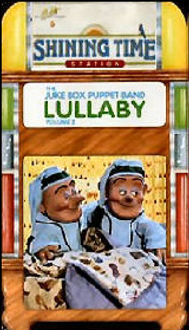
It’s night, the ticket counter is closed and Shining Time Station is empty as we pan towards the jukebox. Inside the stage area, Didi is watching television as Tito and J.J. Silvers count the day’s take, 20 nickels. Didi tells them to be quiet as she’s trying to watch her favorite TV program. J.J. Silvers credits himself for the day’s success, proclaiming that as long as they have him as their manager, they’ll become rich. Rex asks Tito how much money today’s take amounts to. Before he can answer, Tito is interrupted by J.J. Silvers who asks Rex to explain what he means by “how much money” and repeats that they made 20 nickels.
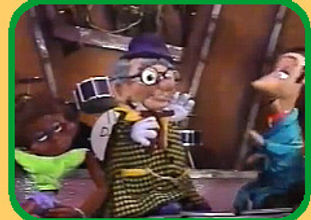
Rex clarifies that he’s asking how much that equates to in dollars. Explaining that a nickel is worth 5 cents, J.J. goes into a complicated discourse of trying to multiply 5 by 20. Grace interrupts to answer that they made one dollar. Not to be upstaged, J.J. shouts that the real answer is 100 cents and asks Rex to confirm. Rex in turn replies that 100 cents equals one dollar! Tito makes a pun that it was “another day, another dollar,” to which he and J.J. laugh hysterically. J.J. suggests that to prepare for another busy day, they should all get some sleep. Tito suggests that they should first sing a goodnight song. Tex tells Didi to turn off the TV set, and everyone takes their places. The band performs “Union Train.”
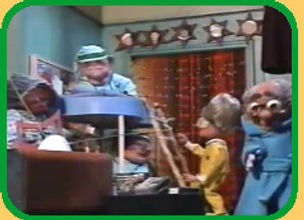
The jukebox powers off after the song, and we hear the band members saying good night to one another in their sleeping quarters. Didi wishes Tex good night but is met my silence. Rex prompts his brother to say good night to Didi, but Tex complains that he can’t sleep because he’s trying to think how much a dollar a day would give them in a week. As they begin figuring it out, J.J. Silvers berate the band members for not being asleep and demands to know what’s wrong. Tex shouts back a reply that he can’t sleep whilst Rex explains why. J.J, again berates them by stating that taking care of money is his to worry about and that they should only worry about singing. Tex apologizes and J.J. suggests that they watch a lullaby on TV which will put Tex to sleep. He inserts and plays a video tape of “the Greatest Hits of the Jukebox Band,” and we’re treated to a performance of a Cowboy Medley of “Cowboy’s Dream” and “My Home’s in Montana.”
After the song it appears that Tex has fallen asleep, and the rest of the band tries to quietly return to their beds. Tex suddenly bolts up and yells “SEVEN,” and explains that they would make seven dollars in one week. J.J. appears to confirm that the total is correct, but warns that they won’t be making any money if they’re too tired to perform the next day, and shouts good night at them before turning out the lights. Text then asks aloud how much money that would equate to in a year. Didi suggests that J.J. try playing another lullaby on the television and we watch the band perform a traditional version of “Home on the Range,” with the Boy Brothers providing the lead vocals. A second song begins as soon as the first one ends, “Railroad Corral,” again featuring the Boy Brothers’ vocals.
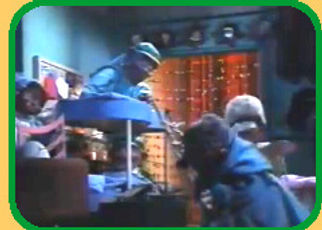
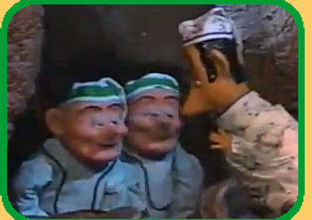
The next scene is of the darkened jukebox powering up, and we see that the Boy Brothers ‘ bunk bed is empty. We discover that they’ve joined Tito in the vault. He’s awake because Tex started him thinking which compelled him to count his nickels. Tex suggests that they sing Tito a lullaby, since that seemed to have worked for him. Tito welcomes the suggestion and the brothers sing “Beautiful Dreamer.” As the bothers perform, we watch as a sleeping Tito has an out-of-body dream sequence filled with glitter and nickels, including one that slow-dances with him! At the end of the song Tito returns to his body and we notice that he’s now sleeping soundly.
Up above, Didi calls out to Grace in the darkness. Grace asks her what she wants, and Didi asks if she’s asleep. Grace replies wearily that she isn’t any more while Didi complains the same, mentioning that the lullaby worked for Tito and the Boy Brothers. Grace offers to play a lullaby video for her and we watch a previous band performance of “The Railroad Cars are Coming.” This song leads into another performance of “Red River Valley.”
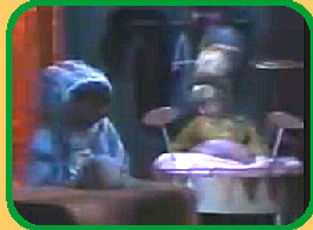
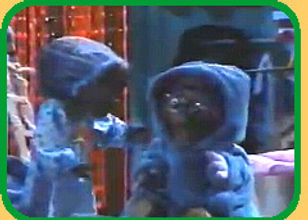
Now it’s Grace’s turn to have trouble sleeping, and she decides to see if a glass of warm milk will help. We suddenly hear her shout and hear someone drop in the darkness. Grace is surprised that it’s J.J. Silvers who is making rounds to see if everyone is asleep. They both check in on the sleeping Boy Brothers and comment how difficult it is to tell them apart, with Grace quipping that even their snores sound alike. Tex suddenly bolts upright again waking his brother Rex in the process asking how much a dollar a day would earn them in a year. Rex surmises that Tex is talking in his sleep. Rex now asks Grace to hear her sing him a lullaby. She hopes J.J. is noticing her popularity as he plays another music video on the television: “The Train is a Comin’.” After the song, J.J. Silvers inserts another video tape with the band performing “The Riddle Song,” followed by “Clementine” sung by the Boy Brothers. This is immediately followed by a performance of “Cumberland Gap.”
As an owl hoots, we hear a knocking in the darkened arcade. The pounding wakes up the entire band as J.J. Silvers tells them that he’ll get it. An entity with glowing eyes descends from the ceiling asking who summoned the Sandman. J.J. admits that he did, but didn’t expect him to wake everyone up! The Sandman informs him that it’s his job to put people to sleep, leaving J.J. to demand why he was knocking on the front door. The Sandman replies rhetorically that he couldn’t find the bell. J.J. impatiently asks him if he’s brought along his magical sleepy dust. The Sandman confirms that he did, and J.J. Silvers orders him to get to work on the band members.
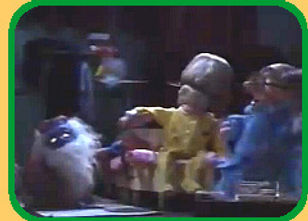
The Sandman replies with “aye, aye,” trying to play on the words “eye” onto which sleepy dust is sprinkled. J.J.’s patience runs out and barks that the Sandman’s jokes are putting him to sleep! J.J. tells him to get busy as he plays a lullaby on the VCR. The video is of the band performing “I Dream of Jeannie with the Light Brown Hair.” As the song plays, we see the Sandman sprinkling sleepy dust on each of the band members’ eyes, making them quickly become unconscious.
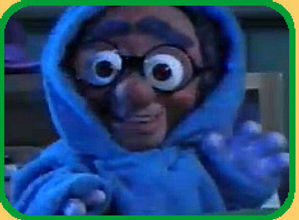
The Sandman is gone, and everyone is sound asleep except for J.J. Silvers lying wide awake in his bed. And trying out every idiom about sleeping; get some shut-eye, catch some zees, hit the pillow, hit the sack, do anything except sleep. He begins shouting for help, waking all of the band members who come to his aid. He complains to his sympathetic troupe that he can’t sleep. They decide to sing a lullaby for J.J. As Grace tucks him in, the band sings a lullaby medley of “All Through the Night,” “All the Pretty Horses,” and “Golden Slumbers.” By the end of the song J.J. is snoring loudly.
We pan away from the jukebox as we hear the band members once again wish one another good night. The special closes when the only response Didi hears from Tex is snoring, and the jukebox powers down leaving the arcade in complete darkness.
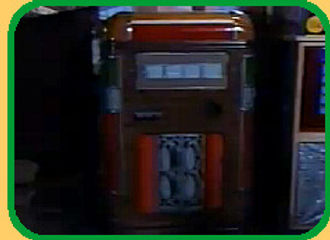
Featured Jukebox Puppet Band Songs:
-
Union Train, from “Just Wild about Harry’s Workshop” (Season 1)
-
Cowboy Medley: Cowboy’s Dream, My Home’s in Montana, from “How the Station Got its Name” (Season 3)
-
Home on the Range
-
Chattanooga Choo-Choo, from “Is Anybody There? (Season 2)
-
Railroad Corral, from “Pitching In and Helping Out” (Season 1)
-
Beautiful Dreamer
-
The Railroad Cars are Coming, from “All’s Fair” (Season 2)
-
Red River Valley from “Mapping it Out” (Season 1)
-
The Train is a-Comin’, from Ring in the Old (Season 1)
-
Riddle Song, from “Do I Hear?” (Season 2)
-
Clementine, from “Things that go Ga-Hooga in the Night” (Season 1)
-
Cumberland Gap, from “Washout” (Season 2)
-
I Dream of Jeannie, from “He Loves Me, He Loves Me Not” (Season 2)
-
Lullaby Medley: All Through the Night, All the Pretty Horses, and Golden Slumbers, from “Stacy Forgets Her Name” (Season 3)
Episode Notes:
-
Identical to the concurrently released video "A Day in the Life," this special opens with the Shining Time Station theme and main title before shifting to scenes from inside the jukebox.
-
The band members saying good night to one another from their beds is reminiscent of the closing scenes of “The Waltons,” a popular television show from the 1970s.
-
J.J. Silvers and the Boy Brothers have a running gag in the special when J.J. mistakenly addresses the brothers by their incorrect names, which they are quick to correct, much to J.J.’s annoyance.
-
The performance of “Home on the Range” is different than the groovy version performed by the band in the Season 2 episode “A Dog’s Life.” This version is sung in the traditional fashion by the Boy Brothers.
-
Though the vocals of “Beautiful Dreamer” are from the Season 3 episode “Mr. Conductor’s Big Sleepwalk,” new video sequences were taped for the special.
-
New video was mixed in to show the Sandman at work during the music video performance of “I Dream of Jeannie”, originally heard in the Season 2 episode “He Loves Me, He Loves Me Not.”
-
Only part of the Lullaby Medley video from “Stacy Forgets Her Name” was used for this segment of the special. New video of the band singing the medley to J.J. Silvers was taped and inserted at the beginning of the song.
-
The Lullaby Medley segment of “Golden Slumbers” is a song written by John Lennon, Paul McCartney and James Paul for the Beatles, an ironic coincidence given Ringo Starr’s association with the Shining Time Station.
Schemer Presents:
The World According to Me!
Quality Family Entertainment 1993 (VHS 1994)
Written by Ellis Weiner
Directed by John Ferraro
Summary by J. Gratton
Description: This direct-to-video release features Schemer attempting to teach the viewer lessons on how to get certain things done from his eclectically decorated bedroom (more like a small apartment with a separate entrance attached to the main house). Schemer's abode is cluttered with vintage items such as lava-lamps, a statue of a conquistador, a Beethoven bust and various toys. Schemer's lessons are taught with the help of special guests, though the one who benefits the most from these lessons is the teacher himself!
It's interesting to note that these featurettes were most likely taped in 1993 after an episode wrap.
From the video's introduction: And now… Schemer Presents! A series of really worthwhile-buying, can't miss, inspirational video lessons that sometimes teaches stuff. Produced by Schemer, written by Schemer, directed by Schemer and starring Schemer as himself. Taped on location, in his very own room. And now, let's join me!
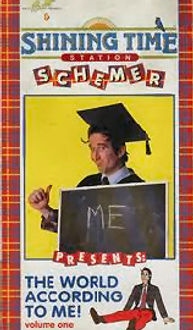
Schemer Presents: Lesson 1
How to get Something Done
Characters and Stars:
-
Schemer (Brian O'Connor)
-
Kara (Erica Luttrell)
Synopsis:
Schemer is tasked to make a sign for Stacy, but his first attempt ends in disaster. Kara drops in to demonstrate how to tackle any project properly.
The scene opens with Schemer coming out of the wall atop a Murphy bed. He folds the bed back into the wall as he gives his introduction, but it continuously tries to open moments after each attempt to close it. He finally props a chair against the wall after it hits his head. Schemer claims that he’s providing these video lessons so that, in his words, “kids, parents, and adult children of grown-up babies” will give him money. Schemer introduces his first lesson on “How to get something done.” In this case it's a sign that Stacy Jones has asked him to make for Shining Time Station.
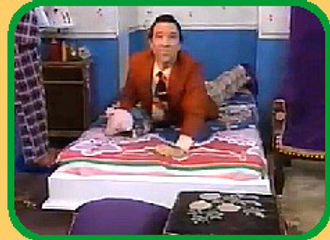

The materials Schemer needs for the task are in his walk-in closet, but when he opens the door a cascade of junk, including a mannequin falls out. He makes his way into the mess and returns with a jar of glue that is leaking all over his hands. The telephone rings just as he’s trying to extricate himself from this “normal glue situation.” With his hand stuck to the phone receiver, Schemer discovers that it’s his “mommy” calling to offer him some advice about his presentations, and to warn him that the jar of glue does not have a lid. Schemer hangs up and ends up falling down as he walks away because his hand is still glued to the phone.
After detaching himself, Schemer goes back into the closet to find additional materials. When the doorbell rings, we hear a loud crash and yell, and Schemer emerges covered in feathers and glitter. The visitor is Kara who questions Schemer about his appearance. She berates a snarky Schemer for wasting an hour when she discovers that he hasn’t begun working on the sign yet. She gives him some helpful advice as he complains about not finding anything to clean himself up of the sticky mess. Kara hands him a nearby towel and advises him to ask for help the next time.

Schemer slips on the glue as he makes his way to the closet. As he tosses things out, he misinterprets Kara’s advice as encouragement to do everything at once. Kara corrects him by explaining that you should tackle any job in steps:
Step 1 - You think about the best way to do your project.
Step 2 - You lay out your materials (just as Schemer emerges with a marker and a large piece of paper).
Step 3 - You work on your project.
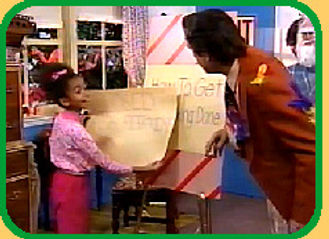
With the proper sign-making materials at hand, Kara asks what is supposed to be written on the sign. Schemer replies that it should read “CLOSED FOR REPAIRS” as Kara begins to write it out. A pleased Schemer saunters over to his keyboard and sings a ditty about the correct way to do a project and about his experience with the glue, feathers and glitter. When the song is over, Kara presents the finished sign, and the segment ends with both of them leaving to present the sign to Stacy.
Schemer Presents: Lesson 2
How to Have Style à la Schemer:
Characters and Stars:
-
Schemer (Brian O'Connor)
-
Schemee (Jonathan Shapiro)
-
Skip (William Colgate)
Synopsis:
Skip the carpenter visits Schemer to repair the malfunctioning Murphy bed. As Schemer promotes “how to have style à la Schemer,” Skip ends up teaching him about personal style and the benefits of being unique.
Schemer reads out fan letters (that turn out to be ones he’s written to himself) complimenting and asking about his style. This leads into his introduction of the second lesson about the importance of having style. He first removes his jacket and drapes it over his mannequin. As he explains that having style shows that you have respect for yourself and others, he removes his shirt, tie and pants and also drapes them over the mannequin. He goes on to say that sloppy people make others sad, and it’s revealed that Schemer is wearing a pair of pink polka-dot leotards and pink tank top. As he slips on a blue tutu, Schemer emphasizes that his new outfit does not represent “style à la Schemer.”
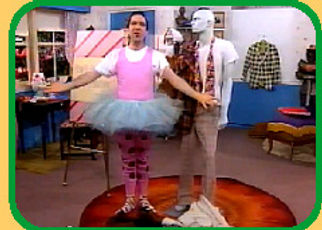

Schemer then starts a beat on his keyboard and stands back as he demonstrates the second part of his lesson, an impromptu fashion show featuring Schemee as a model with his uncle providing the running commentary. Schemee emerges from the closet dressed in a "crisp and bouncy spring outfit" wearing shorts, a tam, knee high socks and carrying a golf bag. A moment later, he reappears as a "tropical biz-wiz extraordinaire in this groovy summer ensemble” comprised of plaid shorts, floral shirt, a brown leather cap and a butterfly net.
Seconds later Schemer introduces “the Boy Wonder who put the ‘Ah’ back in entrepreneur,” dressed in a sweater, school cap, knee-high socks, shorts and carrying a tennis racket. Lastly, Schemee emerges in a “winter get-up” complete with earmuffs, a winter coat and carrying a pair of ice skates. The fashion show is interrupted by the doorbell which at first Schemer believes is coming from the keyboard. He turns the keyboard off and realizes that it’s the door and calls out to the person to come in.
It’s Skip the carpenter who has come to repair Schemer’s bed. Schemer asks if he wants to know why he’s dressed in a tutu, but an unfazed Skip replies “to each his own” before going to work. Schemer resumes the lesson by pointing out on the mannequin that his choice of shirt, tie, jacket and pants show that he’s “a classy guy who’s basically a genius.” Schemer notes that something is missing and adds a curl to the mannequin's head, and encourages everyone to copy his style. When Schemer opens the floor for questions, Skip asks why should everyone dress and look exactly as he does.
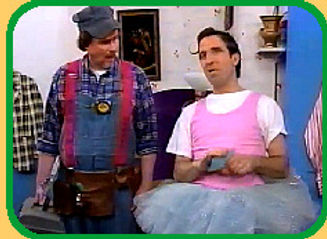
Schemer retorts that when something is successful, you let it succeed, and asks if he agrees that his style looks terrific. Skip argues that Schemer may find it terrific, but it’s not for him. He tells Schemer to wear the style of clothes himself if he likes it, but that doesn’t mean that Skip is obliged to wear it. An offended Schemer insists that this is his show and that his style makes him look unique. He then tries to make it appear that the mannequin agrees with him. Skip points out that if everyone looked like him, it wouldn't be unique or style à la Schemer anymore; it would be boring. Schemer begins to mull over Skip's advice as the carpenter leaves to get a repair part from his truck, but not before first warning Schemer NOT to sit on the bed.
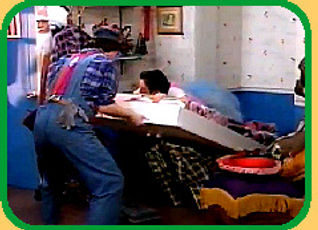
Schemee asks his uncle if he’s going to let Skip talk to him that way, but the now-inspired Schemer sings and plays a selection on his keyboard about wearing the right clothes for the right situation and keeping them clean as long as they’re right for you. After the song Schemer lies down on the bed and tells everyone to forget about mimicking his style because they will never look as good as him anyway. The bed suddenly lifts up and traps Schemer inside the wall. Schemer begins warning his nephew not to be hamming it up in front of the camera (which he does anyway). The segment ends when Skip returns with the part and lowers the bed from the wall to free a grateful Schemer.
Schemer Presents: Lesson 3
How to use a Telephone
Characters and Stars:
-
Schemer (Brian O'Connor)
-
Dan Jones (Ari Magder)
Synopsis:
Schemer attempts to teach the viewer the finer points of telephone etiquette, but Dan appears to know a little more than he does!
The scene opens with Schemer speaking to his mother on the telephone and promising to meet her in five minutes. After hanging up, Schemer states that the objective of this lesson is to learn how to be polite and proper on the phone. Part one of the lesson is to lift the receiver and listen for the dial tone; however it begins to ring as soon as he hangs up. Thinking it is Dan, he picks it up only to hear his mother reminding him to go to the store to buy some food for his lunch. Moments after hanging up, his mother calls again to see if he’s gone to the store yet.

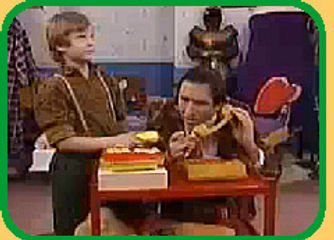
The doorbell rings and Schemer welcomes Dan in to help demonstrate how to use a phone. Schemer sets Dan up with a toy phone to make pretend calls to him while he uses the real phone. Schemer will show viewers how to answer a call. Dan dials and tells Schemer that he’s waiting for him to answer the phone. A flustered Schemer says that he can’t until he hears a “ring-ring” sound. Dan obliges and asks to speak to Schemer. Schemer replies "To whom shall one kindly say is calling, perhaps?” Schemer suddenly drops the receiver when he hears a recorded voice telling him to please hang up and try calling again.
Schemer is mortified, thinking there’s a small robot trapped inside of his telephone, and builds up the courage to ask if it needs help. An operator cuts in to in to warn him that the telephone is not a toy and orders him to hang up. The telephone rings again and Schemer picks up the receiver and repeats what the operator just told him and abruptly hangs up before the caller is able to speak.
The next part of the lesson is what to say if the person you are calling isn’t there, and instructs the audience to pretend that the phone is ringing. When it actually does begin to ring, Schemer compliments the audience that this is very good pretending when Dan reminds him that it’s really ringing. It's his mother reminding him once again to go to the store to buy food, and if he doesn’t eat his lunch she won’t be giving him any cocoa that night. Picking up where they left off, Dan pretends to call and asks for Schemer. Schemer replies that “Schemer is not home right now, I’m busy,” and hangs up.
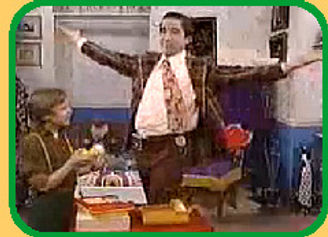
Dan tells him that what he just did was improper when the telephone begins to ring again. Schemer tells Dan not to answer in case that it’s his “mommy.” When Dan insists, Schemer relents and instructs him to inform her that he’s busy. Dan picks up the phone and informs her that Schemer can’t come to the phone right now, and asks if he can take a message. After the call Dan tells him that his mother wants him to pick up some milk at the store, but Schemer is more interested in what Dan did near the end of the call. Dan tells the viewers that when someone calls and the person they’re looking for isn’t there, you should always ask to take a message.
This revelation inspires Schemer to play and sing a song about what he's just learned from Dan. After the song, Dan reiterates his advice and adds that another option is to politely ask the caller to call back later. The skit ends with Schemer complimenting Dan for the lesson and we close to Schemer hamming it up by answering the pretend phone incorrectly.
Schemer Presents: Lesson 4
How to Share
Characters and Stars:
-
Schemer (Brian O'Connor)
-
Buster (Ira Glasner)
-
Schemee (Jonathan Shapiro)
Synopsis:
Schemer tries his best to teach about how to share using Buster and nephew Schemee. The ensuing chaos results in a very unorthodox but creative demonstration of the concept!
The scene opens with Schemer and nephew Schemee seated at a card table. Just as Schemer is about to introduce today’s lesson, the doorbell rings and in barges Buster. The boys are dismayed about each other’s presence and shout "what is he doing here." Schemer tries to settle things down by reminding Schemee that J.B. King is Buster's uncle (and his boss).

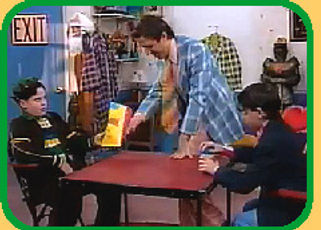
Schemer cowers as Buster tells him to never forget that, and demands to know when he's going to star on that TV show of his. Schemee interrupts to object that his uncle promised him star billing. Schemer calms them down by saying that they'll both be stars in the show; twin billing and they're not even twins. He invites the lads to sit down at the table, and tells them to “shut their eyes and close their ears” as he fetches a special treat for the both of them. Schemer returns with his last can of "Lime Time Slime" for Schemee and his last bag of "Corrodios" for Buster.
Schemer asks aloud why he is giving things away for free and wonders if his “big brain is leaking out of his genius skull.” Schemer clarifies that this is part of today's lesson on how to share. Buster howls that the Corrodios are his now, while Schemee retorts that he's not sharing any of his slime with Buster if he's not going to be sharing the Corridios in return. An exasperated Schemer tries to explain the concept of what he's talking about, and how when we share, we are making an investment and become “sharing people.”
He first tries to make Schemee share his slime, but he's unwilling to do so until Buster shares his Corridios first. Schemer then turns his attention to Buster who only stares him down. Schemer then tries to explain the concept of sharing, but both refuse and begin to tussle. Schemer intervenes by trying to take back the treats from the boys only to topple backwards onto the floor with the table spilling the contents of the bag and can onto him. Schemer tells the viewing audience to ignore what has just transpired, the scary part hasn't happened yet. He begins to bawl that his favorite tie and shirt are ruined thanks to his failed attempts to teach them how to share. As the boys look on, Schemer tastes the mixture of Corrodios and Slime from his jacket and proclaims how good it tastes - kind of slimy, yet crunchy.

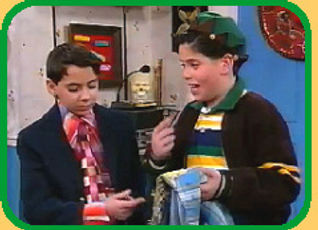
Schemer rebuffs Buster’s attempt to get a sample to taste because of his refusal to share. Schemer relents when Buster threatens to tell his uncle, and offers up his sleeve. Buster is impressed and invites Schemee to try some. Schemee is equally impressed as Buster proclaims that they invented it, with Schemee adding that this shows that they are geniuses. Schemer points out that this is a great example of how to share, with Schemee’s Slime, Buster’s Corridios and Schemer’s jacket as a war zone. As a reward for being good sports and learning a valuable lesson, Schemer removes his jacket and presents it to them to finish eating the new snack concoction.
Buster says that the great thing about sharing is that you always end up with more than what you started off with. Schemee adds that this is something they wouldn't have if they didn't share. Buster then shares his hat with Schemee, with the latter sharing his watch. The boys leave as a satisfied Schemer sings and plays a very brief number about how sharing is like caring on his keyboard.
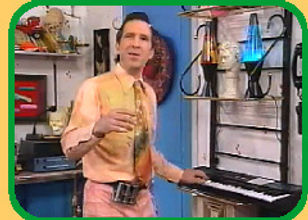
Schemer ends the lesson by saying that sharing is good, just like the Corrodios. He decides to run to the store to pick up another bag of Corridios to go with the slime on his shirt, but realizes that he left his wallet inside his jacket. The scene closes with Schemer running off to catch up with the boys.
Schemer Presents: Lesson 5
How to be Smart
Characters and Stars:
-
Schemer (Brian O'Connor)
-
Ms. Smith (Myra Fried)
Synopsis:
In this lesson, Schemer spends more time trying to show the audience how to fool people into thinking that you are smart. A visit from Ms. Smith, an encyclopedia salesperson, proves to him that this will never work!
The lesson opens with Schemer reading from “The Oxford Anthology of Intelligent Writing”, by J. William Ahem. Schemer is dressed in a smoking jacket with a dollar sign broach. He confesses that he's actually reading "How to Make Money by Brushing Your Teeth," by Meg A. Bucks, but wants everyone to believe that he's reading the big book, which has to do with today's lesson of how to be smart. He attempts to explain why with the use of a scientific chart with only the words SMART. LIKE, PEOPLE and WOW written on it:

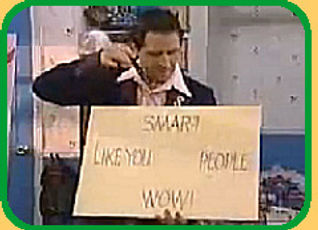
If you are SMART, PEOPLE will say WOW and they will LIKE you, which will cause other PEOPLE to think you are SMART, which makes them say WOW, and they will also LIKE you, and around "infindentamentum" - for a long time.
Schemer implies that it doesn’t matter if you actually are smart as long as people think you're smart, and reveals that today's lesson is actually how to SEEM to be smart. Schemer explains that there are two basic ways to seem smarter than you actually are. The first is to have things around, and the other is to have things to say.
For things to have around, Schemer shows off a chess set, a very smart game. If you don’t know how to play chess you are to reply with "I am not in a chessy mood today." Schemer also recommends carrying around a big book by Shakespeare. If you want people to think you're smart simply say "Hmmm. That reminds me of a big book by Shakespeare." Another thing to have around is art, since it makes people believe that you are a “real brain” if you have art around and like it.

Schemer goes on to say that even if you don’t have any of these items, you can still make people think you are smart by saying certain things. Instead of saying things like "gee-whiz", "mm-hmm" or "sez you", you should say something like "Ah, how terribly interesting", "I think that's a matter of opinion" or "I couldn’t agree more."
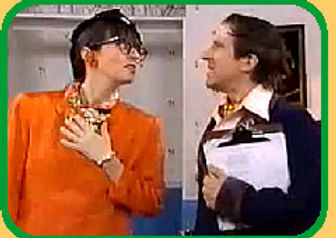
The doorbell rings and it's a salesperson for the Encyclopedia Americana. Schemer closes the door on her and tells the audience (as the doorbell rings again) to watch as he demonstrates how he'll make her think that he's smart. He lets her in and she introduces herself as Ms. Smith, and asks if he's familiar with their encyclopedias. Schemer deflects the question by proclaiming to own a chess set. Ms. Smith is delighted and asks if he plays too. Schemer replies that he won't play today because he's not in a chessy mood. Ms. Smith confesses that she can’t play while she's working, not that she wouldn’t love to.
That prompts Schemer to say that love reminds him of a big book by Shakespeare, to which Ms. Smith replies with a quote "that what love can do, love must do" to a confused Schemer. She enlightens him by informing him that the quote is from Romeo and Juliet.
Unfazed, Schemer walks up to his painting, takes a deep whiff and asks Ms. Smith to agree that it is good art. She recognizes it as Whistler's Mother which again sends Schemer into confusion. She explains that it's a painting by Whistler of his mother, to which Schemer replies with one of his lines that it's “a matter of opinion.” Ms. Smith corrects him by stating that it's a matter of fact, to which Schemer retorts "how terribly interesting."
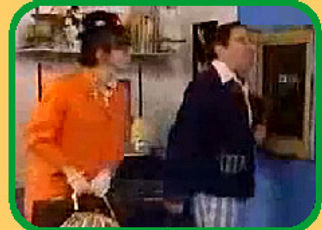
Seeing though his façade, Ms. Smith pointedly asks Schemer if he does not understand anything she said, with Schemer accidentally slipping that he “couldn’t agree more.” He defensively confesses the truth adding that at least he’s making an effort to fake being smart.
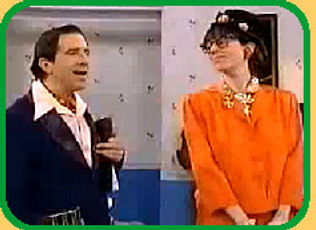
Ms. Smith asks him why he'd want to do that as people will lonely lose respect for him when they find out the truth. Schemer argues that if people discover that you don’t know anything, they'll think you're dumb. Ms. Smith corrects him by saying that it's the opposite; they’ll think he's smart if he's not afraid to ask questions. And, the more questions you ask, the smarter you'll become. An enlightened Schemer then runs to his keyboard to sing and play a song about what he's just learned.
Ms. Smith takes her leave as Schemer basks in his newfound knowledge. The lesson ends as Schemer runs outside to ask Ms. Smith inane questions such as what was the first question ever asked, who asked it and what was the answer.
Schemer Presents: Lesson 6
How to Tie Your Shoes
Characters and Stars:
-
Schemer (Brian O'Connor)
-
Becky (Danielle Marcot)
Synopsis:
Schemer once again tries to deviate from the lesson’s subject by promoting progress. After a chaotic demonstration, Becky discovers his secret and helps him overcome it for a successfull lesson conclusion.
Schemer is lying in bed showing off his stocking feet to emphasize today's lesson on how to tie your shoes. He then reveals the real lesson as "Why You DON'T Need to Tie Your Shoes." Schemer explains that the change in lesson content is due to progress. He demonstrates that laced shoes do not represent progress, whereas his newly discovered pair of Velcro shoes does. Becky peers through the window as Schemer plays with his shoes' Velcro fasteners as he espouses that with Velcro shoes, you will never have to tie your shoes, or deal with knots and broken laces.


The doorbell rings and Schemer tells Becky that he's in the middle of filming a lecture on the “march of progress,” and that there'd better be a good reason for her interruption. Becky explains that his mother asked Becky to go get Schemer because she's waiting for him at the station. Schemer panics, then calms down when he realizes that thanks to progress he can quickly slip on his Velcro shoes with his eyes closed. He crosses the Velcro straps as he does so, which naturally causes him to fall down as he takes his first step. Schemer begins to wail when the Velcro straps rip off one of his shoes when he tries to unfasten them. Schemer is surprised that Becky has heard of Velcro as she reaches for his pair of laced shoes and tells him to put them on.
Schemer refuses by claiming that the laces don't match what he's wearing. He runs to fetch another pair of Velcro shoes from his closet when its contents spill out into his room. He dives in and returns with a shoebox. Unfortunately, there's only one Velcro shoe in the box. He decides to wear the unbroken Velcro shoe with the new one, but they're both for the right foot. Schemer suggests that he only needs to wear one to hop, but Becky discourages him of doing that saying that the station is too far. Schemer then demands Becky‘s shoes. Becky refuses saying that her shoes are too small for his feet, but Schemer retorts how would she know if his feet aren't instead too big for her shoes. He then suggests wearing his slippers, but quickly changes his mind as that would land him in trouble with his "mommy" if she sees him wearing them outside the house.
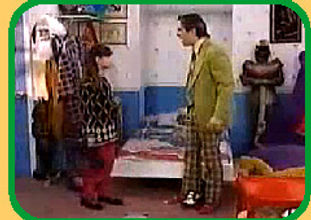
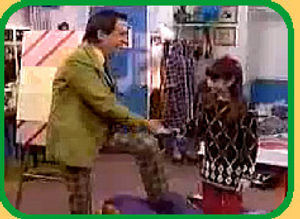
Becky asks him what's wrong with his laced pair. Schemer confesses that he can't tie his shoes without his mommy's help, and blames progress for it. Becky offers to show him how leaving Schemer overjoyed as he can now present the lesson as originally intended. Becky demonstrates that you first put your shoes on and pull the laces up tight, then make an "X" by crossing the laces. Then pull one of the laces over, under and through to create a knot and pull tight. You then take one of the laces and make a loop. Then you wrap the other lace around it and double it beneath itself. Then you create a second loop and pull it through the gap and pull tight.
Schemer is elated by his newfound skill and celebrates by singing and playing a song about how to tie your shoe, though promotes using Velcro shoes near the end of the song. The lesson ends as Becky leads Schemer out with him telling the audience to learn how to tie laces just in case.
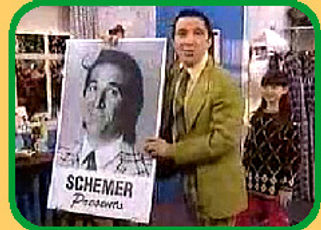
Notes:
-
In "How to Get Things Done", When Schemer is speaking to his mother on the phone, the voice that is heard is actually sped-up audio from a scene with Stacy and Harry from Promises, Promises (see Season 1: Promises, Promises Episode Notes).
-
Schemer's fold-up bed is known as a "Murphy Bed", invented by William Murphy for small living spaces and one-room apartments. During the day, the bed can be folded-up into the wall, and lowered at night for sleeping.
-
The pay telephone on the wall is the same prop featured in Season 3 of the series. The gumball machine in the room is also a borrowed prop from the series.
-
The plate with Schemer's face hanging above the pay telephone is the same one seen at the beginning of Season 3's Schemer's Robot.
-
The dollar sign broach in the "How to be Smart" segment is the same one worn by Schemer in Season 3's Schemer's Special Club.
-
The framed collection of combs seen on the wall confirms Schemer's hobby mentioned in Season 2's Crackpot.
-
In "How to Have Style à la Schemer", William Colgate (Skip) also appeared as a mover in the Season 3 episode The Joke's on Schemer. By coincidence, Myra Fried (Ms. Smith) also appeared in the same episode as a passenger.
-
Goof: Schemer calls Skip by his name despite Skip only introducing himself as ‘a carpenter.’
-
Each segment was originally included as bonus material on VHS releases of regular Shining Time Station episodes.
-
How to Have Style à la Schemer was featured on the VHS home Video of Schemer Alone (Classic Volume 2).
-
-
The Lime Time Slime prop seen in Lesson 4 looks like a modified jar of Skippy Peanut Butter whereas Coritos is reminiscent of Doritos snack food.(contributed by Daniel Celano)
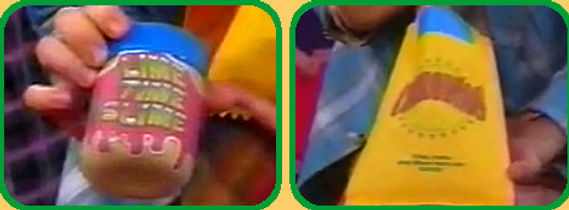
Lime Time Slime (left) and Coritos (right)
Additional Featured
Schemer Presents Lessons
Quality Family Entertainment 1993
Written by Ellis Weiner
Directed by John Ferraro
Summary by J. Gratton
In addition to The World According to Me!, individual Schemer Presents segments were featured separately as bonus material on VHS releases of individual Shining Time Station episodes. All of these segments were taped in 1993, were written by Ellis Weiner and directed by John Ferraro.
Schemer Presents:
How to Clean up your Room / How to Make Your Bed
Characters and Stars:
-
Schemer (Brian O'Connor)
-
Becky (Danielle Marcot)
Synopsis:
Schemer demonstrates how to clean up your room, leaving his friend Becky impressed at the cleanliness, but suspicious of where Schemer may have stashed away all of his clutter. When the truth is revealed, the exercise turns into a lesson on how to make your bed.
The segment opens with Schemer wearing a single white glove busily feather-dusting his lava lamps. Schemer compliments himself by asking the viewers if they notice how neat his room is. He professes that “neatliness is next to Schemeliness.” As he prattles on, the doorbell rings, and Schemer notices that it’s his friend Becky. He invites the audience to watch as he impresses her by how tidy his room is.

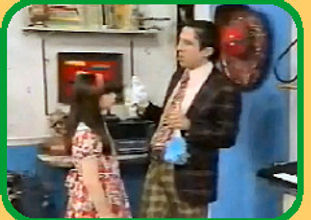
Becky notices immediately, but asks Schemer what became of all his stuff. Schemer replies that everything has been put away neatly, leaving Becky to ask where, given the many things he had. Schemer reiterates that they’ve all been stowed away neatly in the place they’re supposed to be. He then points out that he’s invited her to help him with today’s lesson, “How to Clean Up Your Room.” He asks her to repeat “Boy, Schemer. You really did a great job cleaning your room.” Becky parrots the line deadpan as she looks around the room trying to figure out where everything went.
She asks if he’s also cleaned the closet making Schemer defensive and he tries to divert her attention away from opening it, pointing out that today’s lesson is about how to clean your room, not your closet. Becky asks to look inside the closet and accuses Schemer of hiding all of his clutter inside it. Schemer insists that it’s clean and refuses to open his closet door, leading Becky away from it.
Becky insists on seeing the closet for herself, leaving Schemer hysterical about her dirtying the doorknob with her dirty fingerprints. He finds a kaleidoscope on the floor and asks her where it should belong. She replies the closet. Schemer intercepts and corrects her by saying that it belongs on his dresser at the other end of the room. As he points to the location, Becky makes her way to the closet door and opens it as Schemer shouts at her not to. She’s amazed to discover that it IS clean as Schemer chuckles for pulling off a ruse.
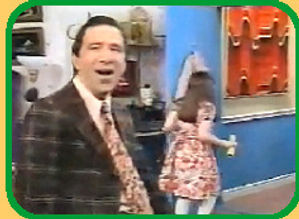
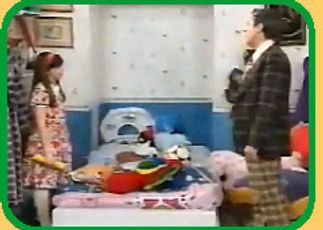
Becky asks once more where everything went to, and Schemer reiterates that “everything is where it should be,” as he slams the closet door shut. The loud report causes the Murphy bed to fall open from the wall, revealing where Schemer stashed away his junk! Becky tells him that he needs to pick up his belongings, plus make his bed. Schemer complains that he’s not good at making beds, but Becky offers to show him how. The first thing is to remove all the objects off of it, which Schemer does with gusto with things flying everywhere which amuses Becky.
As Schemer works, Becky instructs that you next pull the sheets and blankets away from the pillow end of the bed, and then tuck each sheet corner in one at a time. You then tuck the sheet in at the foot of the bed and smooth it out. You then repeat the process with the cover blanket. Everything folds over before it reaches the pillow. Lastly place the pillow on the bed and smooth out the top layer. Schemer adds that the only thing left to do is to take your favorite piggy (stuffed toy), and kiss it goodnight (place it on the bed).
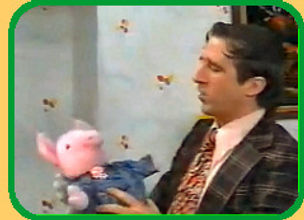

Schemer thanks Becky and concludes the lesson by singing a song on his keyboard about how to make a bed. At the end of the song Schemer counsels everyone to practice making their own bed tomorrow as it’s a very important part of your overall neatness – like keeping your curl greased. Becky adds cleaning your room as another example. Schemer agrees, but defers that task to a future action-packed lesson. Now that he’s made his bed, he wants to lie down in it, and as he does so, it flips up back into the wall with him trapped in it. Answering Becky’s concerns that he’s only taking a rest, he asks her to flip the lesson card over to the “Schemer Presents” sign. As soon as Becky does so, the bed opens. The segment ends as Schemer puts on his shoes and he leaves the premises with Becky.
Schemer Presents:
How to Apologize
Characters and Stars:
-
Schemer (Brian O'Connor)
-
Jane the Professional Actress (Jayne Eastwood)
Synopsis:
Schemer writes a play about teaching the audience how to apologize. It backfires when the professional actress he’s asked to help him turns his make-believe script into a real-life situation.
The segment opens with a beret-adorned Schemer holding a script and a human medical skull which he tosses away when the skullcap falls off. Schemer introduces us to Jane the Professional Actress. Jane begins to complain, but Schemer explains that Jane is here to help him teach a very important lesson in a dramatic fashion: “How to Apologize.” Jane interrupts to say that she believed that they would be doing a show. He shrugs her off and announces that he’s written a scene which Jane will help him act out as themselves. The setting is a small French café somewhere in Indian Valley. Schemer begins the scripted scene about his arcade with expanded dialogue for himself, leaving Jane with only the lines “uh-huh.” Jane’s replies become increasingly terse with each line delivered.
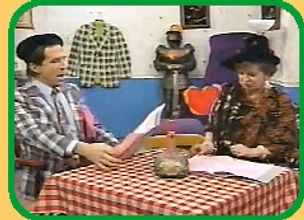
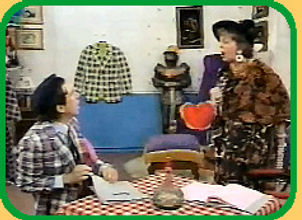
Schemer’s script has him moan about Jane always visiting his arcade, but never spending a nickel. When he gets to the line demanding for an apology, Jane loses her patience and tells him that this is terrible. Schemer thinks that’s one of her lines from the script and asks her what page it’s on. Jane bellows that Schemer Presents isn’t a show, it’s a joke. Schemer begins to protest, but Jane reminds him that she was told that they’d be doing a real play with actors, costumes and make-up, and that she would have an important part in it. She’s incensed that her only lines are “uh-huh.” Schemer tries to pander to her by saying that she delivers the line so well, when she suddenly demands an apology.
Schemer wheezes a laugh, thinking that she’s joking. He points out that according to the script; he is the one asking for an apology. Jane explains that the script is make-believe and that he owes her a real apology for not telling her the truth about the skit. When he realizes that she’s serious, Schemer winks to the viewer and begins a long-winded, insincere apology. He congratulates himself for his delivery, but Jane tells him that it was the worst apology she’s ever heard. She goes on to add that delivering an apology that you don’t mean is as bad as not apologizing at all. Schemer protests that he was trying to, though Jane tells him that an apology is genuine only when you realize how the other person is feeling. She then asks Schemer how he would feel if she misled him the same way. Schemer admits that he’d feel angry about wasting his time when he suddenly realizes how Jane feels.
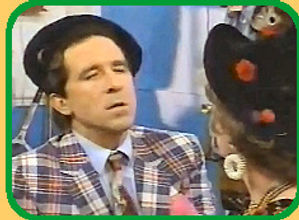

A sober Schemer finally delivers a sincere apology which is accepted by Jane. As she leaves, and enlightened Schemer plays a tune on his keyboard, singing about the need to be sincere when making an apology. At the end of the song Schemer admits making a mess today; although it was done in a dramatic way and that he has it all on tape. The segment ends when Schemer spots Jane looking at him through the window and runs outside to pursue her as she dashes off.
Notes:
-
Jayne Eastwood also played Helga Boonswaddle in the Season 3 episode Bad Luck Day at Shining Time Station.
Schemer Presents:
How to Have Good Table Manners
Characters and Stars:
-
Schemer (Brian O'Connor)
-
Schemee (Jonathan Shapiro)
-
Ed Hooyen the Painter (Michael Polley)
Synopsis:
Schemer’s attempts to teach everyone what he believes are good table manners are foiled by Ed Hooyen the painter, who drops in as he and Schemee are trying to enjoy a spaghetti dinner.
Schemer opens the segment by offering lunch to the viewers, a big bowl of spaghetti, which is the object of today’s lesson, “How to Have Good Table Manners.” With the help of his nephew Schemee, who is seated at a decorated table, Schemer explains that having good table manners is important as it’s very easy to offend other people while you are eating. Good table manners show that you have respect for other people, and they in turn will have respect for you. All the while Schemer is talking, he is picking strands of spaghetti from the bowl using his fingers and eating it!


Schemer tells the audience how good the spaghetti and how he is so hungry, which elicits a loud burp from Schemee. As he’s reproached by his uncle, Schemee says that he’s also hungry. His uncle sloppily loads the plates with the pasta. Schemee uses a fork to eat his spaghetti while Schemer uses his fingers. The meal is interrupted by someone ringing the doorbell. Schemer opens the door and tells the elderly man standing there that his “mommy” is not home, and tries to shut the door. The man comes in anyway saying that his mother asked him to come in for an estimate for how much it will cost to paint the house.
He tells them to act as if he’s not there, but suddenly introduces himself as Ed Hooyen to which Schemer replies “gehsundheit” before introducing himself and his nephew Schemee. Ed tells them to enjoy their meal and pretend he’s not there. He then compliments Schemer for having such a fine young nephew, and reveals that he has four children of his own with three grandchildren.
As Schemer mumbles a response, Ed berates him for talking with his mouth full as it is impolite. Schemer reminds him that they’re taping a show about table manners which prompts Ed to once again tell them to pretend that he isn’t there. When Schemer mentions the word spaghetti to the viewer, Ed interrupts by confirming what they’re eating and comparing it to linguini. Schemer pleads to be left to continue the lesson to which Ed again proclaims to be not there.
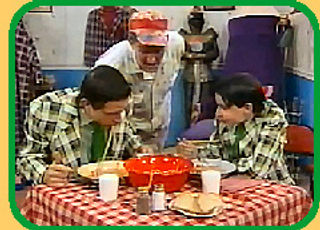
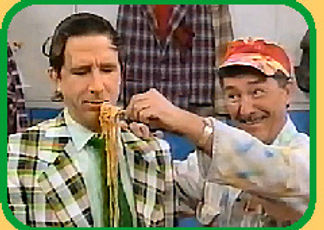
Schemer claims that knives and forks are important and that they should be used once in a while. Schemee blurts an order to Schemer to pass the salt. Schemer says it is important to keep your face down in the bowl and to be sure to breathe as you eat. Ed watches everything unfolding in horror and intervenes, telling Schemer that this is not the proper way to eat and that he should be embarrassed to do that in from of such a fine young lad like Schemee. Schemer doesn’t like Ed’s interruption and demands to know why his table manners are so important to him.
Ed explains that the proper way to eat is to sit up straight, place the napkin on your lap; you keep your left hand on your lap unless it’s needed to hold the fork while you use the knife. You then bring the food up to your face, not the other way around. As he feeds Schemer a forkful of spaghetti, Ed tells him to chew his food properly and reminds him to not talk with his mouth full.
Schemer suddenly begins rapping the table with his utensils yelling “gimme the salt!” repeatedly. Ed intervenes once again, telling Schemer that if he wants salt, he should ask for it nicely as “Please pass the salt.” Schemer repeats the request in a stentorian voice. Schemer then claims to have learned something today and is inspired to put it to music. He runs to his keyboard and sings a song about proper table manners. After approving the song, Ed leaves, as Schemer returns to sit down at the table.
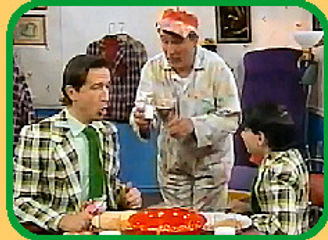
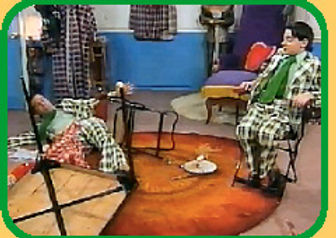
Schemer is about to share his thoughts when Ed appears in the window barking an order at him to keep is elbows off the table. This startles Schemer which sends him and the table toppling backwards onto the floor. The segment ends with Schemer setting up for the next lesson, putting the table upright and pretending to continue eating.
Notes:
-
Michael Polley also played Rusty McRail in the Season 3 episode Stacy Cleans Up.
-
This segment was featured at the end of the VHS episode version of "Billy's Party" (Classic Volume 6).
Schemer Presents:
The Meaning of Time
Characters and Stars:
-
Schemer (Brian O'Connor)
-
Kara (Erica Luttrell)
Synopsis:
Schemer is supposed to deliver a freshly-baked loaf of bread to the station to put on the next train to Dillylick for one of Stacy's friends. Intending to demonstrate the meaning of time, the lesson's aromatic prop becomes too tempting for Schemer's gluttony and he begins to eat it. The train has departed without the loaf of bread aboard, leaving Kara to intervene to explain the importance of planning ahead and making a schedule.
The scene opens with Schemer entering his room carrying a freshly baked loaf of bread. It’s smells so good that he wants to taste it, but is interrupted by the telephone ringing. It’s Stacy Jones calling to remind him to bring the loaf of bread to the station within the next five minutes to send to her friend on the next train to Dillylick.
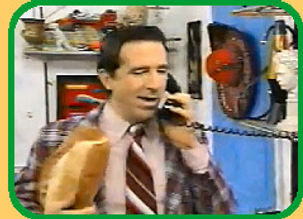
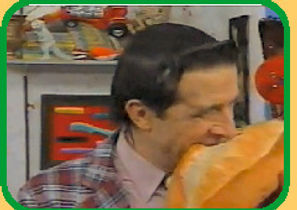
Schemer is distracted and ponders making a Schemer Presents lesson about how to eat bread. He gets so carried away by the idea that he takes a big bite out of the loaf, relishing the taste. He returns his attention to today’s topic which is “The Meaning of Time”. Schemer’s way of explaining time is by demonstrating brief pauses and silence in his actions. Schemer then demonstrates how clocks keep track of time by first using an old fashioned time piece, an hourglass. He takes another bite from the loaf as he “watches your past form into little piles of sand.”
Schemer then walks over to his dresser to show the viewer what a modern clock looks like; it has a face and hands. Schemer describes its use in the second part of his lesson about how to make a schedule. He explains that a schedule is a “timey” list of things to do, and begins to check off what he’s accomplished so far:
1. Get Bread
2. Do Show
3. Check off items
4. Take bread to station
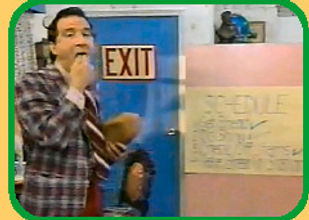
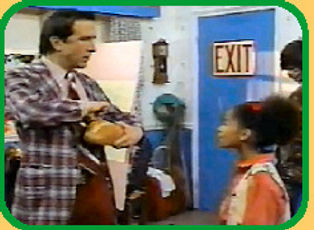
Schemer shrugs off item number four saying that he’ll take care of it later as he eats another piece of bread. The doorbell rings and it’s Kara who has been sent by Stacy to check up on what happened to the bread Schemer was supposed bring to the station. As he continues to pick off pieces and eating them, Schemer denies that anything happened to the bread, and goes so far as to offer some to Kara.
A train whistle is heard which causes Kara to sigh that it’s now too late. Schemer feigns ignorance and asks what is too late. Kara explains that the whistle indicates that the train to Dillylick has left, and she berates Schemer for trying to teach people about time despite not being able to keep his own schedule.
Schemer admits that he needs to get going and races through the rest of the lesson on how to tell time by claiming that the clock has two hands; a big one and a small one that chase each other around really fast, and the given time is determined by whoever gets there first. A dismayed Kara tells him that he’s wrong, with Schemer confesses that he is – that is why he wears a watch with big numbers. Kara pleads with Schemer to teach some basic ideas about time to the audience, but he’s clueless.
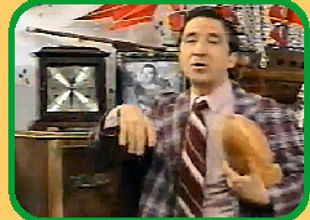

Kara uses bringing the loaf of bread to the station as an example. She adds that you need to make a basic estimate of how much time you’ll need. If there are a lot of things to do, you need to set aside some time to get each one done. She explains it plainly that you need to plan ahead and make a schedule. Schemer points out that he’s already made a schedule, but Kara counters that he didn’t stick to it. She describes a schedule as a promise, and he didn’t keep his. Schemer continues picking away at the bread as he tries to make a pun about “who’s got the time” and makes the excuse that he had too many things to do, and asks Kara sarcastically what would happen if he didn’t plan ahead. Kara replies that he’d miss the train to Dillylick. Schemer asks why Stacy’s friend couldn’t get the bread tomorrow. Kara counters that the bread would be half-stale and wants him to confess not being able to stick to his schedule.
Schemer admits that she’s correct and begins to play a song on his keyboard about time. After the song Schemer breaks off and offers a piece of bread to Kara before he brings it to Stacy. Kara says that the loaf is a mess and that he can’t give it to Stacy in that condition. Schemer then tries to insert the torn piece of bread back into the loaf, which prompts Kara to leave. Schemer turns the lesson card around to the “Schemer Presents” sign to set up the next lesson. The segment ends as Schemer offers his photo a piece of bread, then crams it into his own mouth as he laughs and chases after Kara.
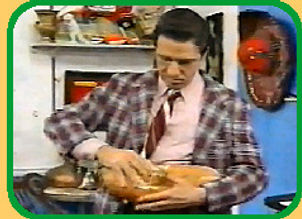
Notes:
-
The picture of Schemer on the dresser is the same one used in the Season 3 episode Schemer’s Alone.
-
Stacy's telephone voice where she is speaking to Schemer is actually sped-up audio from a scene with Stacy and Harry from Promises, Promises (see Season 1: Promises, Promises Episode Notes).
-
Kara and Schemer (except for his tie) are wearing the same clothes seen in the Season 3 episode Mr. Conductor's Evil Twin. Odds are that this Schemer Presents segment was taped before or after the episode's taping.(Contributed by Daniel Celano)
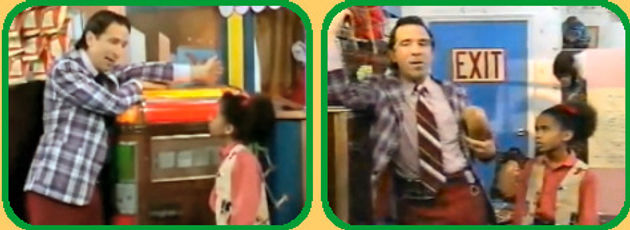
Mr. Conductor's Evil Twin (left) - The Meaning of Time (right)

